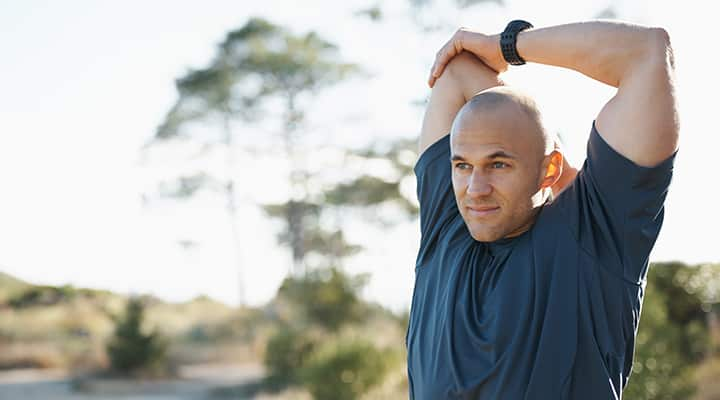
What Are the Benefits of Morning Sunlight?
Published: July 2024
When was the last time you got up early to greet the sun and enjoy the warmth of morning sunlight kissing your skin? Hopefully you gift yourself with the experience of morning light often. It has more benefits for your brain and body than you may think!
The rhythm of life literally revolves around the sun. We are a part of nature, and so the influence of natural sunlight on our body's internal clock, or circadian rhythm, is no different. Plus, sunshine helps us get our vitamin D. Find out how to get the most out of your time in the morning sun.
Why is it important to get sunlight in the morning?
There are several reasons to get sunlight in the morning:
1. Mood booster
Have you noticed how sunlight affects your mental well-being? Spending time outside and in the sunlight can release serotonin in your body. One of the happy hormones, serotonin helps boost your satisfaction level and sense of well-being so you can start your morning on the right foot. If you notice yourself feeling like you got up on the wrong side of the bed, a dose of morning sunlight could be just what you need to put yourself on track for a second start.
2. Vitamin D levels
Morning sunlight helps your skin generate vitamin D. Like the other vitamins we need to function and flourish, vitamin D plays a vital role in our bodies, and it is very difficult to get from diet alone. We have many reasons to maintain a healthy vitamin D level:
- It is essential for bone health. This vitamin helps keep bones healthy and strong to provide a healthy structure to our bodies. This allows us to enjoy quality of life at every age.
- It plays a role in cardiovascular health. Going out in the morning light is one of the simplest ways to help keep the heart healthy.
- It is essential to immune system health and optimal energy levels. Going outside first thing in the morning is a simple, achievable action to give the immune system a boost.
- It boosts brain health and supports mental health. Give your mind all the help it can get first thing in the morning to set yourself up for success every day.
- It is important for kidney function. Our kidneys work hard for us, so getting morning sunlight to boost our D levels is the least we can do to make their job easier.
3. Sleep quality and cortisol levels
Sun exposure in the morning is an essential part of our circadian rhythm (also known as our sleep-wake cycle). Sunlight helps with feelings of alertness, and the serotonin it releases helps begin the process for us to produce melatonin. Exposure to light earlier in the day contributes to melatonin production sooner, leading to more ease in falling asleep and a healthy internal clock. This helps with sleep quality and encourages waking refreshed with healthy cortisol levels. In addition, research has shown that exposure to morning sunlight may improve sleep maintenance for those not getting adequate sleep. One study found that 25 minutes of morning light therapy before 9 a.m. helped participants feel less tired during the day after only two weeks. Light therapy has also been studied to support restful sleep and healthy sleeping patterns.
4. Overall well-being
Going outside early to greet the sun has a host of other benefits, including increased activity levels, fresh air and the potential to connect with nature. These habits encourage overall health inside and out by boosting our mood and supporting healthy sleep and stress management.
What is the best way to get sunlight in the morning?
Your best option for getting morning sunlight is simply to enjoy it as soon as you wake up. Depending on the transparency and direction of your windows, getting sunlight in the morning might be as easy as opening the blinds or curtains. If not, see if you can grab some sunlight (and some steps) by walking outside. This isn't always realistic, though; you're not always ready to leave the house first thing in the morning. If that's the case, do your best to step out on your porch even if it's just for a few minutes. Or better yet, create a morning ritual that works in sunlight exposure to other tasks you need to get done, anyway.
Explore Our Best Mood Support Supplements
9 ways to work sunlight into your morning routine
Too busy to bask in the morning sunshine? These nine ideas may already be on your to-do list; with a little tweaking, you can do them al fresco!
1. Go for a walk solo, or walk your dog
Sometimes it can feel like your dog's nose is walking you. So depending on the experience you want to have, you may want to walk alone. (Please do not tell my dog!)
2. Practice morning yoga outdoors
Get your morning flowing with a few poses or even an entire practice. If the weather isn't cooperating, move your practice into a well-lit room.
3. Meditate outside
Give yourself a double dose of goodness by combining morning sunlight with sitting in stillness.
4. Rest while you sunbathe
Instead of hitting the snooze button in bed, catch a few more ZZZs in the sunlight. Nothing can beat easing into your day and letting your body absorb the sun's rays.
5. Play with the kids
Give yourself and the little ones the benefits of morning fun in the sun.
6. Lean into morning stretches
Are there any stretches that feel good to you? Practice those outside for a great start to your day.
7. Do Tai Chi or qigong
Connect with life-force energy through these practices for a great foundation for your day.
8. Take a book outside
It can be entertaining, informative or enriching. Choose something you enjoy that speaks to you.
9. Enjoy coffee or tea while soaking in the morning sun
That first cup is one of life's small but great pleasures. Having it outside makes a good thing even better.
How long should you get morning sunlight?
We love the sun, but like everything, too much of the sun is…too much. Everyone's body responds differently to sun exposure, but in general, only 10-20 minutes of direct sunlight exposure is recommended daily. If you spend a longer time in the morning sun, wear UV-protective clothing and a hat to protect your skin.
What if I can't get enough morning sunlight?
As much as we may want to catch some rays, sometimes the weather just doesn't cooperate. And even if you are able to get outside to encourage vitamin D production, it might still be necessary to give yourself a boost of vitamin D to support your heart and bone health, especially as you age. You can help maintain healthy levels of the sunshine vitamin in your body by eating foods high in vitamin D or taking a daily supplement.
Nutritional supplements are a convenient way to help maintain optimal D levels. There are several different options for vitamin D supplements, including vegan D3 and combinations with vitamin K, calcium and iodine that lend additional support to your bone health goals. Talk with your healthcare provider about the best ways to get the nutritional support you need.
Want some advice on the best nutrients to support your bone health? Our health needs quiz can give you the personal recommendations you are looking for.
About the Author: Sarah A. Walker, Ph.D., LMFT, is a licensed marriage and family therapist, an artist, a certified hypnotherapist, an EMDR therapist and a registered yoga teacher. As a lifelong learner and a creative, she brings these skill sets to her specialties and expertise. She integrates creative endeavors as part of the whole mind-body innovative approach to mental health and total well-being.
Website: www.secondfloorsanctuary.com
References
- Chambe J, et al. "Light therapy in insomnia disorder: A systematic review and meta-analysis." J Sleep Res. December 2023. https://pubmed.ncbi.nlm.nih.gov/37002704/
- Mead MN. "Benefits of sunlight: a bright spot for human health." Environ Health Perspect. 2008. https://www.ncbi.nlm.nih.gov/pmc/articles/PMC2290997/
- Menéndez SG, Manucha W. "Vitamin D as a Modulator of Neuroinflammation: Implications for Brain Health." Curr Pharm Des. 2024. https://pubmed.ncbi.nlm.nih.gov/38303529/
- Yoon J, et al. "Feasibility and Efficacy of Morning Light Therapy for Adults with Insomnia: A Pilot, Randomized, Open-Label, Two-Arm Study." Medicina (Kaunas). June 2023. https://pubmed.ncbi.nlm.nih.gov/37374270/
Like what you read?
Please subscribe to get email updates on this blog.











